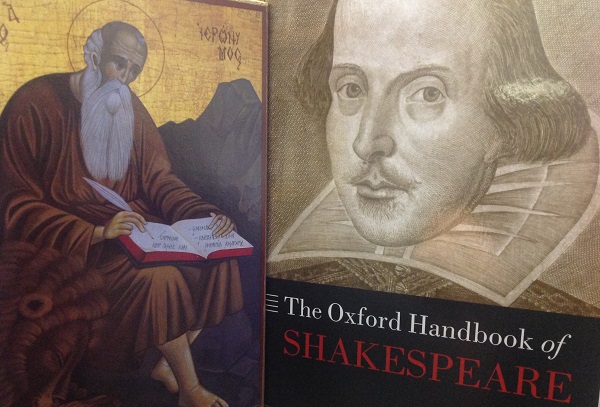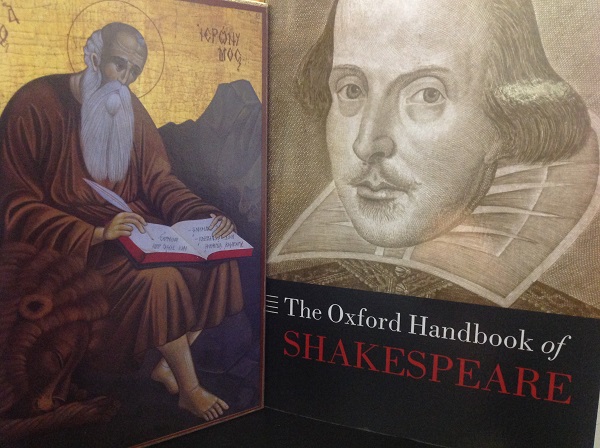
December 16, 2015, by Sunita Tailor
We Read the Past, and It Reads Us: Researching Shakespeare and the Bible
This blog post was written by Dr Jem Bloomfield who tells us about his research on Shakespeare and the Bible.
Why was St Augustine surprised to find St Ambrose reading the Bible to himself? Why did the Shakespearean critic Charles Lamb declare that King Lear should never be performed? These are a couple of the questions which I have had to wrestle with during my research into Shakespeare and the Bible.
These books – or collections of texts – are two of the most imposing and revered in English-speaking culture. They are both “sacred texts”, by which I mean that people read them differently from the way they would read a detective novel or a limerick. My research explores these particular styles of reading, and how both books are used to wield authority in our society.
That might involve looking at how a literary critic tried to work out whether one of Shakespeare’s best friends had betrayed him by tracing the imagery of dogs and sweetmeats in his plays. Or I might investigate a medieval monk who believed that the word “Jerusalem” had four separate meanings when it appeared in a particular sentence.
As those examples suggest, I’m most interested in ways of reading which seem unexpected or even downright weird to me. When someone in the past reads these books oddly, it makes me wonder why my ways of reading seem so natural and reasonable. It highlights the assumptions I automatically make when I pick up either volume, and makes me examine them again.
So when Charles Lamb says King Lear should never be put on stage, it forces me to articulate why I think it absolutely has to be. When Augustine is a bit passive-aggressive about Ambrose reading the Bible quietly to himself, it makes me wonder why I feel that’s an obvious thing to do with this book.
The weirdness of the past ends up making modern culture seem less normal and less inevitable, and suddenly the Royal Shakespeare or the Church of England can appear strange and arcane. Why is the RSC based in Stratford, a town where Shakespeare didn’t write or stage his plays? Why does the British coronation service involve singing verses from the Old Testament, when that same Old Testament says that God didn’t want Israel to have any kings?
It also casts light on the associations which these books have in modern culture; in advertising, in political speeches, in jokes or carol services. When Shakespeare or the Bible appear in these contexts, it’s because people assume they have an obvious and straightforward meaning. My research involves close-reading the carol service, picking apart the joke, and questioning the political speech. The more I ask “why is that funny?” or “why is that impressive?”, the stranger our use of these books seems.
So asking questions of the past ends up with the past asking questions of me. The more I delve into how people have read these books, the more I am forced to examine our own culture’s assumptions about them, and the more exhilarating and fascinating it becomes.
Jem Bloomfield blogs on Shakespeare and the Bible (amongst other topics), and his book “Words of Power: Reading Shakespeare and the Bible” is available here.
No comments yet, fill out a comment to be the first


Leave a Reply